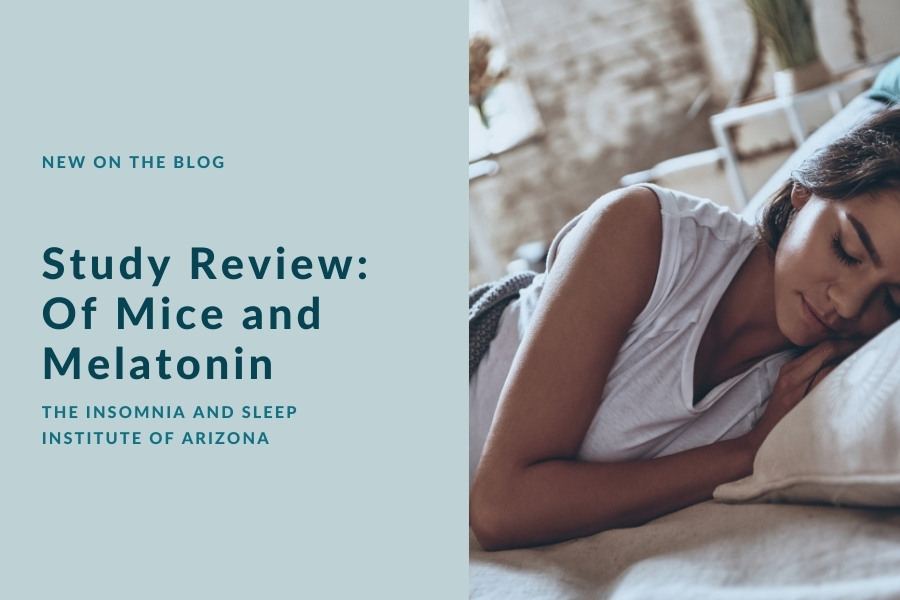Supplements like melatonin can be an effective tool in treating or managing some sleep disorders. The Insomnia and Sleep Institute of Arizona is an outcome-driven facility where every consultation is with a sleep specialist who can correctly diagnose patients before testing and treatment commenced. We are proud to serve you as the Face of Sleep Medicine in Phoenix, setting the bar high with incredible staffing levels that include three sleep specialists, a clinical psychologist focused on cognitive behavior therapy for insomnia, nurse practitioners trained in sleep medicine, and a physician assistant with a Masters in Sleep.
According to recent research led by SUNY Distinguished Professor of Pharmacology and Toxicology Margarita Dubocovich, PhD, and supported by researchers at the Jacobs School of Medicine in Biomedical Sciences, RIKEN in Japan, there’s a lot more to melatonin than many people think. Melatonin is a hormone that is already naturally synthesized by the body, and it does more to the brain’s pineal gland than helping the body achieve more sleep. The full research can be found in the Journal of Pineal Research where Dubocovich and her team found that melatonin plays a number of roles, affecting anything from the reproduction system to the circadian rhythms.
More on Melatonin
The researchers note, “It is well recognized that in both animals and humans, melatonin participates in regulating sleep, modulating circadian rhythms, enhancing immunity, and acting as a multifunctional and anti-cancer agent through actions on its G-protein coupled receptors while retaining the ability to act as a free radical scavenger, antioxidant, and anti-inflammatory agent.” Dubocovich has committed her career to better-understanding melatonin function in mammals.
Her latest research was the first to analyze how endogenous melatonin affects mice and used two mice who were genetically identical—with one key difference. One mouse produced melatonin and one did not. Previous melatonin research using mice only included mice whose pineal gland was removed. This, of course, blocks melatonin production but also stops the production of many other molecules. This means that it was impossible to know if the effects observed were caused by a lack of melatonin, lack of other molecules, or a combination.
The New Mouse Model
With this research, the mouse models could be tested with how endogenous melatonin impacts torpor, body weight, reproduction, and many other physiological functions. It is expected that the results will be used to further scientific understanding of not only how melatonin affects mice but, ultimately, humans as well. Future studies will likely consider how endogenous melatonin plays a role in bone formation, the immune system, inflammation, and metabolic functions.
Researchers found that the mouse with melatonin was able to align their interior “clock” to their surroundings and adjust relatively easily to light/dark cycles. It also had a lower body weight, a decreased reproductive performance, and boasted daily torpor (a means of conserving energy). Researchers were particularly interested in how the melatonin kick-started daily torpor, a type of pre-hibernation that lets mice slow their metabolism down when food scarcity is present or when in cold temperatures. The researchers note that daily torpor has not been confirmed in humans, but there is some interest in such a state—particularly for those in specific careers like astronauts or for critically injured patients.
Melatonin and Jet Lag
The researchers expect their findings to be of value for the treatment of people with sleep disorders as well as seasonal affective disorder (SAD) and/or depression (the three of which often are co-morbidities of each other). Additionally, understanding the role of melatonin when going through “entrainment” (adjusting to light/dark cycles) can be helpful to the study and treatment of insomnia. Researchers report, “mice producing melatonin re-entrained faster after an abrupt six-hour advance of dark onset like in eastbound jet travel, facilitating clock alignment to destination time.”
Melatonin is a popular supplement available over the counter for both adults and children. However, given that it is a hormone, it is not strongly urged to be used long-term on a daily basis. There is still much research that needs to be done on melatonin, but it remains one of many tools for those struggling with sleep disorders. If you or your child is having trouble with sleep, seeing a sleep specialist is the best way to help you get the sleep you deserve. Contact The Insomnia and Sleep Institute today by calling the office or contacting us directly via the online form to schedule your consultation.





